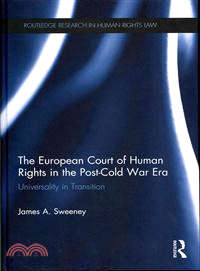商品簡介
"The European Court of Human Rights has been a vital part of European democratic consolidation and integration for over half a century, setting meaningful standards and offering legal remedies to the individually repressed, the politically vulnerable, and the socially excluded. After their emancipation from Soviet influence in the 1990s, and with membership of the European Union in mind for many, the new democracies of Central and Eastern Europe flocked to the Convention system. However, now the "gold rush" is over, the court's position in the "New Europe" is under threat. Its ability to decide cases promptly is almost fatally compromised, and the reform of its institutional architecture is effectively blocked by Russia. The time is right to take stock, to benefit from hindsight, and to consider how the court can respond to the situation. This book examines the case law of the European Court of Human Rights with particular reference to democratic transitions in Europe and the consequent enlargement of the European Convention system. Focusing firmly on the substantive jurisprudence of the court, the book analyses how it has responded to the difficult and distinct circumstances presented by the new contracting parties. Faced with different stages of, and commitments to, democratic transition, how has the court reacted to such diversity whilst maintaining the universality of human rights, and how is this reflected in its judgments? The book tackles this question by matching rigorous doctrinal analysis of the case law with new developments in critical thinking. The cases are viewed through the prism of jurisprudence and political philosophy, with links made to European political integration and other international human rights systems. The book offers an original explanation of the court's predicament by drawing upon "thick" and "thin" notions of morality and tying this to notions of essential contestability."-
作者簡介
Dr James A. Sweeney is a Senior Lecturer in Law at Durham University, UK. He is also Deputy Director of Durham Global Security Institute. Dr Sweeney has acted as an expert advisor to the Council of Europe in relation to freedom of assembly projects in Armenia, Azerbaijan (with the Venice Commission), Georgia, and Kosovo. In March 2011 he delivered human rights legal training to judges of the Ukrainian Supreme Court as part of a UK Foreign and Commonwealth Office project. Throughout 2009 he acted as an expert advisor to the EU's Committee of the Regions as it prepared its Opinion on reforms to the Common European Asylum System. His work on the human rights of failed asylum seekers has been cited by both the UK House of Lords (in its former judicial capacity) and the Court of Appeal.
























